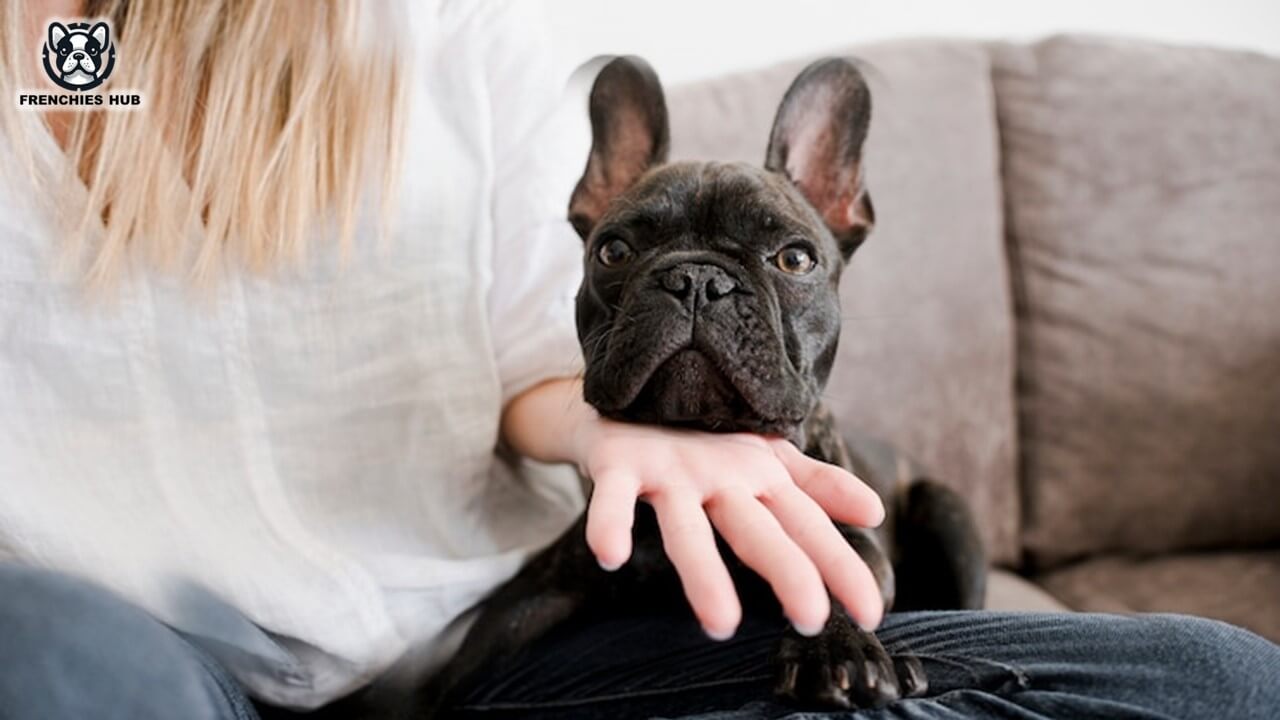As a proud owner of a French bulldog, you’ve likely fallen head over heels for their adorable quirks and affectionate nature. These charming pets are not just dogs; they feel like little French bulldog babies that fill our homes with joy. However, amid the cuddles and playtime, you might encounter occasional growling, which can be puzzling and sometimes concerning.
In my years of experience with French bulldogs, I’ve learned that understanding the reasons behind their growling is key to fostering a happy and healthy relationship. This section delves into why your beloved Frenchie may express this behavior and explores effective solutions to address it. By identifying the triggers and applying compassionate remedies, you can ensure that your French bulldog remains the loving companion you know and cherish.
What Are The Reasons My French Bulldog Is Growling?
Owning a French bulldog brings a mix of joy and challenges, and understanding their behaviors, such as growling, is crucial. Growling can be friendly or unfriendly, and it’s one of the more common reasons owners seek to understand their pets better.
Food Guarding in French Bulldogs: From Instincts to Home Adaptations
One prominent reason a French bulldog might growl relates to food guarding. This behavior isn’t just about being protective over their food bowl; it’s an ingrained instinct. Derived from their wild ancestors, like wolves, who had to guard their possessions to protect the valuable resources they found in the wild. In our homes, though, this behavior is less desirable. It often surfaces during meal time, especially if someone interrupts their feeding. Understanding that this behavior is relatively common among dogs helps in managing it effectively without causing distress to your pet or assuming it is purely unfriendly.
In each scenario, whether it’s food guarding or feeling threatened, the growling of a French bulldog serves as a communication tool, not always an aggressive gesture. By recognizing these triggers and responding appropriately, you can help your Frenchie feel more secure and reduce instances of this behavior.
Unraveling Dominance: Why Your French Bulldog Asserts Control
When our Frenchies interact with other dogs they don’t like, their behavior can quickly escalate from silent stares to growling and barking. This reaction is often a way to establish dominance in what they perceive as their territory or social area. Observing my own French bulldog, I’ve noticed that the desire to let others know about their dominance can trigger these vocal expressions.
This form of communication is not just about being the alpha; it’s about communication within their social structure. They react to signals from other canines, which might be imperceptible to us but are clear as day to them. When a Frenchie feels the need to establish dominance, it is essentially trying to understand and control its social environment. Recognizing this can help us manage situations to reduce conflict and stress for our pets.
Growling, in this context, is less about aggression and more a dialogue about boundaries and social standing. By appreciating the subtleties of these interactions, we can better shape our responses and provide environments where our Frenchies feel secure and less compelled to assert themselves through growling.
The Jealous Heart: Understanding Growling Due to Jealousy in French Bulldogs
Jealousy is a surprisingly complex emotion in dogs, especially in a breed as sensitive as the French Bulldog. These feelings often surface when Frenchies are leashed and encounter dogs off-leash enjoying their freedom. Such situations can make a leashed dog feel resentful, confined by their lack of freedom, leading to growling or even attempts to lash out at other dogs.
In my experience with French Bulldogs, managing their social interactions during exercise can prevent many of these jealous outbursts. Allowing Frenchies to freely frolic and mingle can significantly reduce their claustrophobia—the tightness and restriction they feel when leashed, which often causes this growling.
Moreover, understanding the triggers—like jealousy among dogs in a domestic setting—is crucial. These emotions can be difficult to handle, especially for those not accustomed to dealing with dominant or jealous behavior in pets. Recognizing the need to not ignore such signals is essential, as they often indicate a potential danger or discomfort that the dog wishes to let you know about. They communicate what they want and don’t want through growling and barking; it’s their way of expressing dissatisfaction or discomfort.
Navigating Fear: Why Your French Bulldog Might Be Growling
Fearful behavior in French Bulldogs can often manifest as growling, a natural act of defense when they feel uncomfortable or threatened. This reaction is particularly prevalent in dogs that haven’t undergone proper socialization from a young age. A Frenchie that exhibits fearful reactions might be responding to unfamiliar situations or the presence of other pets and people in their environment.
It’s essential to address these fears to help your pup become more confident and reduce anxiety-induced behaviors. Creating positive associations with the scenarios that scare them is a key strategy. For example, if your dog feels uneasy in a new place, you can help them overcome this discomfort by gradually increasing the amount of time they spend there, ensuring they feel safe and secure. This approach not only builds trust but also strengthens the bond between you and your dog, making your home a sanctuary for them.
Understanding and patiently working through these issues can significantly improve the quality of life for both you and your Frenchie. Remember, tackling fearful behavior effectively involves getting your dog involved in everyday activities and familiarizing them with different settings and faces in a controlled, reassuring manner.
Health Concerns: When Illness or Injury Causes Your French Bulldog to Growl
Sometimes, the reason behind a French bulldog’s growling might be rooted in health issues that are not immediately apparent to the untrained eye. If your Frenchie growls with little provocation or seems to be in pain as it moves around, these could be signs of underlying illnesses or injury.
Having your pet examined by a veterinarian is crucial for their care. Vets perform a physical exam, listening to the breathing, checking the body for any tumors, lumps, or bumps, and testing the nerves by pushing against the skin tissue. These checks can help to locate any treatable conditions your dog may be suffering from, such as patellar luxation, hip dysplasia, or hemivertebra.
It’s important to schedule these exams regularly because vets can often find and diagnose many illnesses from your description of the symptoms. Prompt and accurate diagnosis not only helps in treating the condition but also alleviates the discomfort that may cause your dog to growl or react aggressively.
Effective Strategies to Silence Your French Bulldog’s Growls
When dealing with a growling French bulldog, understanding their environment and the surroundings they react to is key. Often, growling occurs as a reaction to stressful situations or when they feel threatened by other dogs. If you notice this behavior while walking your dog in a crowded area, try moving to a different area where fewer dogs are present. This can help your Frenchie feel less threatened and more at ease, allowing them to calm down more quickly.
Introducing your French bulldog to new people can also provoke growling if they feel uncomfortable. These dogs can sometimes be standoffish, and forcing interactions in an uncomfortable environment only heightens their anxiety. To alleviate this, move to a calmer area, which might help reduce their stress and make the interaction with guests more manageable.
If changing the location isn’t an option, creating a comfortable setting by removing guests from the immediate area or providing private time for your pet can also be beneficial. Incorporating toys and treats that project positive energy can aid in breaking any negative associations your dog has with specific environments or scenarios. These tools are not only helpful in diverting their attention but are crucial during the teething phase for training purposes.
Understanding the root causes of your French bulldog’s behavior and adapting your approach to manage these triggers effectively will enhance the overall wellbeing of your pet, ensuring a happier and quieter home environment.
Suction Frenchie TugToy: A Tool to Curb Growling
Incorporating toys like the Suction Frenchie TugToy can be an effective strategy to manage and reduce growling in your Frenchie. This particular tug toy not only provides entertainment but also serves as a valuable training aid during the teething phase of your pup. The suction cup base attaches firmly to the flooring, allowing your dog to pull with all its strength without causing any damage or inconvenience.
The ball attached to the tug toy is durable enough to endure heavy tugging for long periods and is soft enough to bite and grip safely. Such toys are especially helpful in redirecting your French Bulldog’s energy and attention away from behaviors like growling, channeling their focus towards more constructive activities.
By engaging your dog with the Suction Frenchie TugToy, you harness their physical energy and encourage mental stimulation. This not only helps in strengthening their gums during the teething phase but also provides a controlled environment where they can exert their strength safely and playfully. Such interactive play aids significantly in reducing stress and anxiety, which are common triggers for growling.
Rollify Ball: Flashing LED Light Ball for French Bulldogs
The Rollify Ball Flashing LED Light Ball is a fantastic toy for your Frenchie to play with, especially during the darker hours. This ball illuminates with a glow every time it is bit or hit, providing not only visual stimulation but also an engaging activity for your dog. The light from the ball makes it easy for your pup to locate it in the dark, adding an element of fun and surprise to their play time.
This LED light ball is crafted from durable, non-toxic material, ensuring it can withstand vigorous play sessions. Its ability to engage and entertain makes it an excellent choice for reducing undesirable behaviors like growling. By focusing your French Bulldog’s attention on something positive and enjoyable, you can help dissipate any built-up anxiety or aggression that might lead to growling.
Incorporating such toys into your dog’s daily routine not only enriches their playtime but also aids significantly in their overall behavior management. The stimulation provided by the Rollify Ball encourages both physical exercise and mental engagement, which are key in maintaining a happy and well-behaved Frenchie.
Conclusion
The French Bulldog, a popular breed known for its adorable, doll-like face, often communicates through growling for a variety of reasons. Throughout this blog post, we have examined these reasons and suggested multiple ways to effectively deal with the issue.
Growling in Frenchies can stem from emotions ranging from anxiety to excitement or even discomfort. Understanding the specific cause in your dog is essential for addressing it appropriately. By recognizing the cues that precede growling, owners can implement preventative strategies to reduce these incidents.
We have discussed several approaches to manage and understand this behavior, aiming to improve the relationship between you and your pet. By applying the ways we have suggested, such as modifying the environment or enhancing training techniques, you can help your Frenchie feel more secure and content, thus reducing instances of growling.
As you continue to observe and interact with your dog, remember that each French Bulldog is unique, and what works for one may not work for another. The key is to remain patient and consistent, adjusting your methods as you learn more about your pet’s personality and needs.

